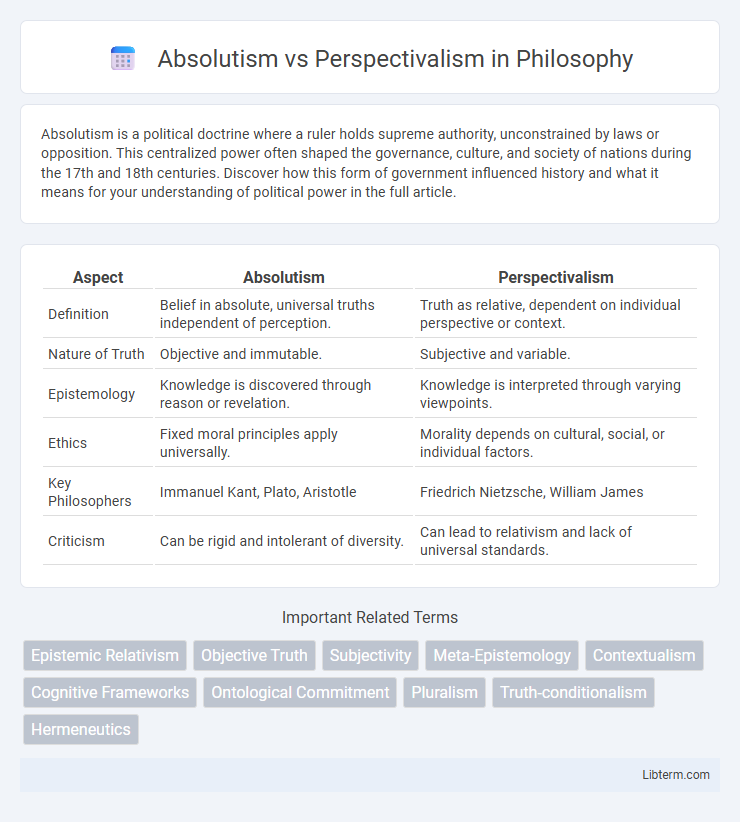Absolutism is a political doctrine where a ruler holds supreme authority, unconstrained by laws or opposition. This centralized power often shaped the governance, culture, and society of nations during the 17th and 18th centuries. Discover how this form of government influenced history and what it means for your understanding of political power in the full article.
Table of Comparison
| Aspect | Absolutism | Perspectivalism |
|---|---|---|
| Definition | Belief in absolute, universal truths independent of perception. | Truth as relative, dependent on individual perspective or context. |
| Nature of Truth | Objective and immutable. | Subjective and variable. |
| Epistemology | Knowledge is discovered through reason or revelation. | Knowledge is interpreted through varying viewpoints. |
| Ethics | Fixed moral principles apply universally. | Morality depends on cultural, social, or individual factors. |
| Key Philosophers | Immanuel Kant, Plato, Aristotle | Friedrich Nietzsche, William James |
| Criticism | Can be rigid and intolerant of diversity. | Can lead to relativism and lack of universal standards. |
Introduction to Absolutism and Perspectivalism
Absolutism posits that certain truths or moral principles exist independently of human perception, asserting universal validity across contexts. Perspectivalism challenges this by emphasizing that knowledge and truth are always interpreted through individual or cultural perspectives, making them inherently subjective and situational. The debate between Absolutism and Perspectivalism centers on whether reality is fixed and knowable in absolute terms or fluid and contingent upon differing viewpoints.
Defining Absolutism: Core Principles
Absolutism is defined by the core principle that moral truths and ethical standards are fixed, objective, and universally applicable regardless of context or individual perspectives. It asserts that certain actions are intrinsically right or wrong based on absolute moral laws that do not change over time or culture. This framework rejects relativism by maintaining that ethical principles exist independently of human opinion or situational variables.
Unpacking Perspectivalism: Key Concepts
Perspectivalism asserts that knowledge and truth are always situated within particular perspectives, emphasizing context-dependent interpretations rather than universal absolutes. It challenges absolutism by arguing that no single viewpoint can encompass the entirety of reality, highlighting the importance of diversity in understanding complex phenomena. Key concepts include epistemic pluralism, contextual validity, and the interplay between observer and observed, which collectively underscore the fluid and dynamic nature of truth.
Historical Origins and Philosophical Roots
Absolutism traces its historical origins to early modern political theories, notably the 17th-century works of Thomas Hobbes, who emphasized centralized authority and immutable truths to ensure social order. Perspectivalism finds its philosophical roots in Friedrich Nietzsche's 19th-century critiques, promoting the idea that knowledge and truth are always interpreted through individual or cultural perspectives rather than absolute standards. These contrasting frameworks reflect foundational debates in epistemology and metaphysics regarding the nature of truth, authority, and reality.
Major Proponents and Influential Works
Major proponents of Absolutism include Immanuel Kant, whose "Groundwork of the Metaphysics of Morals" establishes universal moral laws grounded in reason, and Thomas Hobbes, noted for "Leviathan," advocating strong centralized authority for social order. Perspectivalism is chiefly associated with Friedrich Nietzsche, whose "On the Genealogy of Morality" argues that truth and knowledge are shaped by individual perspectives and power relations. This philosophical contrast illuminates the debate between objective moral principles and subjective viewpoints shaping ethical understanding.
Absolutism in Ethics and Morality
Absolutism in ethics asserts that certain moral principles are universally valid, independent of individual beliefs or cultural contexts. This doctrine emphasizes fixed standards for right and wrong, often grounded in objective truths or divine commands. Consequently, absolutist ethics rejects relativism by maintaining that moral duties and values remain constant across all situations.
Perspectivalism in Culture and Society
Perspectivalism in culture and society emphasizes the interpretation of values, beliefs, and norms as context-dependent and contingent on individual or collective viewpoints rather than fixed, universal truths. It advocates understanding cultural practices and social behaviors through multiple perspectives, recognizing that meaning varies across different historical, social, and linguistic frameworks. By promoting dialogue and pluralism, perspectivalism challenges absolutist claims, fostering tolerance and adaptability within diverse and dynamic cultural landscapes.
Strengths and Critiques of Absolutism
Absolutism asserts universal moral principles that provide clear, consistent guidelines for ethical decision-making, ensuring accountability and predictability in behavior. Its strength lies in promoting objective standards that transcend cultural and individual differences, fostering justice and stability. Critics argue Absolutism can be rigid and insensitive to context, overlooking cultural diversity and situational nuances that demand flexible moral reasoning.
Advantages and Limitations of Perspectivalism
Perspectivalism allows for the recognition of multiple viewpoints, fostering greater understanding and tolerance by emphasizing context-dependent truths. It promotes intellectual flexibility and adaptability in complex social and moral issues but may lead to relativism, making it difficult to establish objective standards or universal principles. The limitation of perspectivalism lies in its potential to undermine consensus and create challenges in decision-making processes where definitive answers are needed.
Absolutism vs Perspectivalism: Contemporary Relevance
Absolutism, with its emphasis on universal moral truths and objective standards, continues to influence contemporary legal and ethical frameworks, ensuring coherence and consistency in decision-making processes. Perspectivalism challenges this by advocating for context-dependent interpretations, highlighting the importance of cultural, situational, and individual perspectives in understanding truth and morality. The tension between Absolutism and Perspectivalism remains central in debates over human rights, multiculturalism, and global ethical standards, reflecting ongoing struggles to balance universality with diversity in modern societies.
Absolutism Infographic

 libterm.com
libterm.com